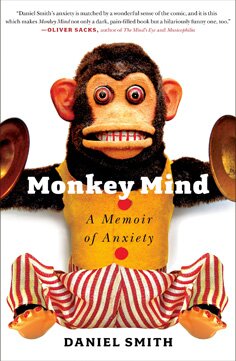Every Friday I ask my mother, Marilyn Smith — psychotherapist, anxiety expert, and genetic wellspring of my neuroses — some questions about anxiety, anxiety disorders, and anxiety treatments.
The series “Ask Dan’s Mom” will continue as a one-on-one correspondence for a little while — until my mother and I exhaust the conversation or she gets pissed at me, whichever comes first. At that point, I’ll open the floor to questions from readers, thus turning the series into a new breed of advice column: Dear Abby for Neurotics. If you have a question about anxiety you’d like me to share with my mother, please email me at [email protected].
Hi, Mom. I hope you’ve had a good week, and that Bennie [her dog, short for “Benzodiazepine”] has stopped throwing up. I’d like to continue along in the same vein as our last round. We talked about the many anxiety treatment options that are out there but we didn’t talk specifically about psychotherapy. I think a lot of people who feel anxious or panicky seek out therapy but don’t know what kind of therapy is best. Do you have an opinion on this?
Funny you should mention Bennie. He just threw up again (this time yellow bile!) and I’m getting worried that he may be sick. Also, Grandma may have to go back into the hospital if she doesn’t do her deep breathing exercises to clear out her lungs. It’s interesting: whether you’re very old and sick like your 95-year-old grandmother or young and anxious like you, breathing helps. I mean the diaphragmatic, deep breathing that can relieve symptoms of anxiety. When you slow down your breath, you slow down your mind … which usually helps you feel calmer. Which brings me to your question about psychotherapy, of which, yes, there are many kinds. Like most therapists these days, I have a practice that draws on many different therapeutic traditions (“eclectic” is what people call this informed mixing and matching), but with anxiety I incline toward cognitive-behavior therapy. CBT often focuses on the breath, as well as teaching techniques to change your negative thoughts. The emphasis is on the here and now. I believe that people who are too anxious to delve beyond the surface should work with a CBT therapist to relieve their symptoms.
Sorry to hear about Bennie, Mom. And I’ll call Grandma as soon as I can and urge her to do her exercises … There are two points here: the importance of breathing and the usefulness of CBT. Let’s take them one by one. Regarding the breathing, this is something you’ve always told me to do and I’ve pretty much always ignored the advice, probably to my detriment. Is the only importance of breathing the one you enumerate — that slowing down the breath slows down the mind? Or are there physiological benefits, too? And what exactly is the right way to breathe for someone who is anxious?
Wow, I love this question because I’ve been trying to convince you for years to breathe. I find it interesting that so many people like yourself resist the one technique that can turn things around. If you can control your breath you will calm the mind and slow down the body — and prevent the symptoms that come from shallow chest breathing. You know what I’m talking about: the sweating, the chest pressure, the shortness of breath, the lightheadedness, etc. OK, so now you want to know the right way to breathe! Here it is. Step One of the breathing lesson is to shut off your cell phone, the television, the lights, take off your glasses, loosen your clothes … no distractions. Then, lie down in a bed or on a recliner (if you’ve got one) and place one hand on your chest and one hand on your belly just below your belly button. Breathe in through your nose, gently … don’t force it. Then exhale through pursed lips, slowly. Don’t worry about anything at this point but trying to get the air into your abdomen. If you’re doing it correctly then the hand resting on your belly will rise and the hand resting on your chest will stay still. It takes time to learn the right technique, so be patient. Do this for a week or so and then I’ll give you Step Two. The idea is to do it every day for at least five to ten minutes. And don’t expect immediate results. Be patient.
I’m interested that you call breathing “the one technique that can turn things around.” That’s a pretty big claim, especially coming from a therapist — that is, from someone who is dedicated to communication as a means toward recovery. Did you mean to be so definitive?
Perhaps it is a big claim, Mr. Monkey Mind, but I stand by it. If you don’t slow down your breathing and thus your mind and body, it is much more difficult to change your scary and usually irrational thoughts into thoughts that are more realistic and less negative. Those who practice deep breathing religiously (and I don’t mean only on Sundays) find that it becomes automatic and they’re better able to ward off panic attacks and control the anxiety. There is absolutely nothing to lose and a lot to gain. So just do it!
All right, all right! I’ll do it! Stop hounding me! Jeez. And next week you can tell me Step Two. Also, we can move on to talking about therapy and CBT. Have a good weekend, Mom!







Being the wife of your brother, Dan, and son, Marilyn, I have seen with my own eyes the power of this deep breathing you write about. It really is a miracle technique. Many an anxious night has he had, and now after many years of practice he can bring himself down from the ledge without needing me to say “breathe…let’s do it together. In for 4, out 8…”.
I’ve been in this family 18 years now and so this is all old news of course. But the years surrounding Lenny’s (Dan’s dad) death actually taught me how to be anxious. Believe it or not I really never felt anxious in that way before (shortness of breath, light-headedness, etc). Must be the part-shiksa side of me:) And so I had to also learn the breathing technique to nix it. I use it now whenever I feel nervous or anxious and it’s a great way to gain control.
It’s so important to get this information out there to people who suffer unnecessarily. Thanks for posting!
I’ve been using meditation and breathing techniques for years to quell my anxiety, and I honestly think its had a greater impact than just about anything else. It becomes easier all the time for me to view those few embarrassing or anxiety-ridden moments throughout my day as fleeting moments, not to be dwelt on for too long and not to lose my cool over after they’ve occurred. For me, getting distracted by negative, anxious thoughts has been a serious problem. I think that learning to let go of those thoughts and participate in my life in real time has been a major step in the right direction
Also, having the discipline to just push through the fear and do things that trigger my anxiety seem to help over time. I’m taking a public speaking class right now, and let me tell you, times are tough. I get up in front of the class, my heart rate is jacked, and I honestly get dizzy trying to make eye contact with the other students. But getting through the process and coming out on the other end still in tact is great to look at in hindsight. Maybe it was difficult, and it is quite possible that I made an ass of myself – but I’m still here and I’m no worse off from the experience.